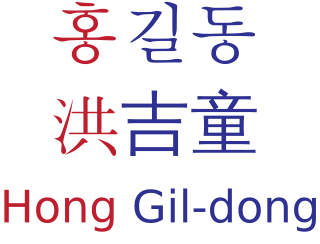There are the following lists of Korean names:
Ho may refer to:

A Korean name in the modern era typically consists of a surname followed by a given name, with no middle names. A number of Korean terms for names exist. For full names, seongmyeong, seongham, or ireum (이름) are commonly used. When a Korean name is written in Hangul, there is no space between the surname and the given name.

A personal name, full name, or prosoponym is the set of names by which an individual person is known, and that can be recited as a word-group, with the understanding that, taken together, they all relate to that one individual. In many cultures, the term is synonymous with the birth name or legal name of the individual. In linguistic classification, personal names are studied within a specific onomastic discipline, called anthroponymy.

McCune–Reischauer romanization is one of the two most widely used Korean language romanization systems. A modified version of McCune–Reischauer was the official romanization system in South Korea until 2000, when it was replaced by the Revised Romanization of Korean system introduced two years earlier. A variant of McCune–Reischauer is still used as the official system in North Korea.
Lists of the most common surnames by continent:
Mina may refer to:
Kim or KIM may refer to:
Min or MIN may refer to:
Lists of East Asian surnames include common Chinese, Japanese, and Korean surnames, or family names.
Seok, also spelled Suk, is a rare Korean family name held by about 56,500 South Koreans, as well as an element in some Korean given names.
Tak or TAK may refer to:
Jeon (전), also often spelled Jun, Chun or Chon, is a common Korean family name. As of the South Korean census of 2000, there were 687,867 people with this name in South Korea. It can be written with three different hanja, each with different meanings and indicating different lineages.
Kyung, also spelled Kyoung, Gyeong, Kyeong, or Kyong, is an uncommon Korean family name, as well as a single-syllable Korean given name and an element in many two-syllable Korean given names.
Myung, also spelled Myeong, Myong, or Myoung, is a Korean family name, a single-syllable Korean given name, and an element in some two-syllable Korean given names. Its meaning differs based on the hanja used to write it.
Moon, also spelled Mun, is a Korean family name, a single-syllable Korean given name, and an element in some two-syllable Korean given names. Its meaning differs based on the hanja used to write it.
Ju, also spelled Joo or Chu, is a Korean family name and an element in Korean given names. Its meaning differs based on the hanja used to write it.
Tae, also spelled Tai or Thae, is a rare Korean family name, a single-syllable masculine Korean given name, and an element used in many two-syllable Korean given names. As a family name, it is written with a hanja meaning "great", while in given names, it may have a variety of meanings depending on the hanja used to write it.
Seon, also spelled Sun, is an uncommon Korean family name, as well as an element in Korean given names. Its meaning differs based on the hanja used to write it.
In is an uncommon Korean family name and an element in Korean given names. Its meaning differs based on the hanja used to write it.